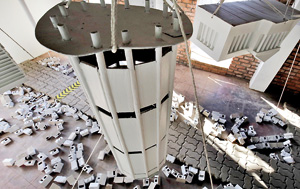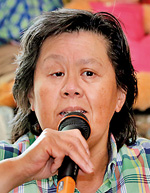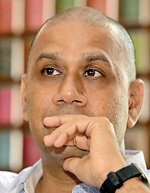Sunday Times 2
Cinnamon Colomboscope: Where diversity reigns
View(s):Cinnamon Colomboscope, the arts festival opened on Friday, August 21 with preview events to mark its two main programmes. The exhibition ‘Shadow Scenes’ curated by Menika van der Poorten and Natasha Ginwala will occupy the Rio Hotel until August 30, while the talks and literature programme titled ‘The City. Identity. Urbanity’ curated by Radhika Hettiarachchi ends today, Sunday, August 23, evening.

The installation by students of Moratuwa University (above) and other exhibits (below)

Kerry Young
The talks and literature programme commenced with a preview by Kerry Young and Naresh Fernandez, who read excerpts from their published work and indulged a rather quiet, but appreciative audience with glimpses into their own lives and histories. Young, an author of British-Jamaican-Chinese descent, read from her critically acclaimed novel ‘Pao’, a tale about a young Chinese boy moving to multicultural and mysterious Chinatown in Kingston, Jamaica. Young, who was born in Kingston herself, discussed the challenges of portraying cities as not just places but as a completely multi-sensory experience in the eyes of her protagonist.
Indian author Naresh Fernandes, editor of Scroll.in, read from his non-fiction work ‘City Adrift’, a contribution he made to a series of publications on Indian cities. Fernandes related his fascination for cities and their origins and of his fondness for hometown Bombay. He noted that it was important “for books to tell you what cities like Bombay are really like, unlike what you see in Bollywood films and on tourist brochures,” adding that “cities cannot flourish unless they work for everybody.”

Pedro Gomez-Egana’s rooftop 'observatory'. Pix by M.A. Pushpa Kumara
‘Shadow Scenes’ at the Rio Hotel was characterised by its heady enthusiasm for multi-media, with photographs, videos and installations dominating the artwork available for viewing across seven floors of the hotel. Here, 40 plus artists – both local and international – presented their work. Many artists, like Pedro Gomez-Egana whose rooftop ‘observatory’ overlooked a spectacular view of the city, drew from their surroundings for inspiration and contribution.
It was International Alert’s exhibit that drew in a steady stream of visitors at the opening; the organisation invited several artists, photographers, design students and film-makers to contribute with their take on Colombo.

Naresh Fernandes
Some, like Abdul-Halik Azeez, found that the cityscape changed before their very eyes over an incredibly short span of time. Halik’s collection of photographs was taken over a duration of two years with many of the structures that were captured having been demolished in the recent past.
Several Instagrammers were also invited to contribute with the hashtag #MyColombo; their work captured Colombo as you and I know it – a businessman at a Bombay Sweet House keeping a keen eye on his cash register, two women observing the world go by from a doorstep, among others.
Students of the Moratuwa University portrayed the rapid, take-no-prisoners development of the city with an installation that juxtaposed the economically underprivileged dwellings of the city with the proposed high-rise utopia that authorities promise.
If you’re free today, catch the rest of the talks and literature programme happening primarily at the Victoria Masonic Hall in Slave Island. It’ll end with ‘Kacha!Kacha!’ at the Castle Hotel, a trilingual poetry session that sounds promising. Shadow Scenes is open for the rest of the week at the Rio Hotel-wear comfortable shoes, because the building lacks accessible walkways, and make sure to spare a couple of hours to appreciate the impressively diverse range of art on display here.

